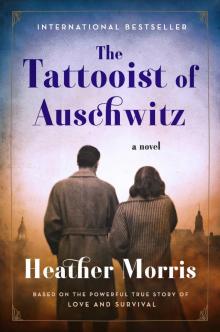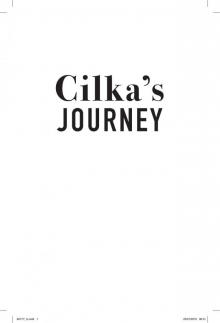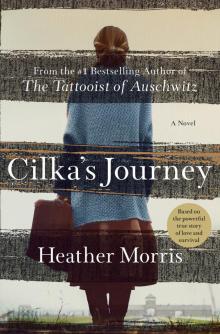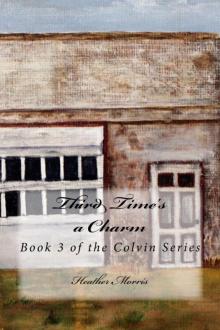- Home
- Heather Morris
Cilka's Journey
Cilka's Journey Read online
Begin Reading
Table of Contents
About the Author
Copyright Page
Thank you for buying this
St. Martin’s Press ebook.
To receive special offers, bonus content,
and info on new releases and other great reads,
sign up for our newsletters.
Or visit us online at
us.macmillan.com/newslettersignup
For email updates on the author, click here.
The author and publisher have provided this e-book to you for your personal use only. You may not make this e-book publicly available in any way. Copyright infringement is against the law. If you believe the copy of this e-book you are reading infringes on the author’s copyright, please notify the publisher at: us.macmillanusa.com/piracy.
To my grandchildren, Henry, Nathan, Jack, Rachel and Ashton
Never forget the courage, the love, the hope given to us by those who survived and those who did not.
This is a work of fiction based on what I learned from the first-hand testimony of Lale Sokolov, the tattooist of Auschwitz, about Cecilia “Cilka” Klein, whom he knew in Auschwitz-Birkenau; from the testimony of others who knew her; and from my own research. Although it weaves together facts and reportage with the experiences of women survivors of the Holocaust and the experiences of women sent to the Soviet Gulag system at the end of the Second World War, it is a novel and does not represent the entire facts of Cilka’s life. Furthermore, it contains a mix of characters: some inspired by real-life figures (in some instances, representing more than one individual), others completely imagined. There are many factual accounts that document these terrible epochs in our history and I would encourage the interested reader to seek them out.
For more information about Cecilia Klein and her family, and about the Gulags, please turn to the end of this novel. I hope that further details about Cilka and those who once knew her will continue to come to light once the book is published.
—Heather Morris, October 2019
CHAPTER 1
Auschwitz Concentration Camp, January 27, 1945
Cilka stares at the soldier standing in front of her, part of the army that has entered the camp. He is saying something in Russian, then German. The soldier towers over the eighteen-year-old girl. “Du bist frei.” You are free. She does not know if she has really heard his words. The only Russians she has seen before this, in the camp, were emaciated, starving—prisoners of war.
Could it really be possible that freedom exists? Could this nightmare be over?
When she does not respond, he bends down and places his hands on her shoulders. She flinches.
He quickly withdraws his hands. “Sorry, I didn’t mean to scare you.” He continues in halting German. Shaking his head, he seems to conclude she doesn’t understand him. He makes a sweeping gesture and slowly says the words again. “You are free. You are safe. We are the Soviet Army and we are here to help you.”
“I understand,” Cilka whispers, pulling tight the coat that hides her tiny frame.
“Do you understand Russian?”
Cilka nods yes. She grew up knowing an East Slavic dialect, Rusyn.
“What’s your name?” he asks gently.
Cilka looks up into the soldier’s eyes and says in a clear voice, “My name is Cecilia Klein, but my friends call me Cilka.”
“That’s a beautiful name,” he says. It is strange to be looking at a man who is not one of her captors but is so healthy. His clear eyes, his full cheeks, his fair hair protruding from beneath his cap. “Where are you from, Cilka Klein?”
Memories of her old life have faded, become blurred. At some point it became too painful to remember that her former life with her family, in Bardejov, existed.
“I’m from Czechoslovakia,” she says, in a broken voice.
Auschwitz-Birkenau Concentration Camp, February 1945
Cilka has been sitting in the block, as close as she can get to the one stove that provides heat. She knows she has already drawn attention. The other able-bodied women, her friends included, were forcibly marched out of the camp by the SS weeks ago. The remaining prisoners are skeletal, diseased, or they are children. And then there is Cilka. They were all meant to be shot, but in their haste to get away themselves, the Nazis abandoned them all to fate.
The soldiers have been joined by other officials—counter-intelligence agents, Cilka has heard, though she’s not sure what that means—to manage a situation the average soldier has no training for. The Soviet agency is tasked with keeping law and order, particularly as it relates to any threat to the Soviet State. Their role, she’s been told by the soldiers, is to question every prisoner to determine their status as it relates to their imprisonment, in particular if they collaborated or worked with the Nazis. The retreating German Army are considered enemies of the State of the Soviet Union and anyone who could be connected to them is, by default, an enemy of the Soviet Union.
A soldier enters the block. “Come with me,” he says, pointing to Cilka. At the same time, a hand clutches her right arm, dragging her to her feet. Several weeks have passed and seeing others being taken away to be questioned has become part of the routine of the block. To Cilka it is just “her turn.” She is eighteen years old and she just has to hope they can see that she had no choice but to do what she did in order to survive. No choice, other than death. She can only hope that she will soon be able to return to her home in Czechoslovakia, find a way forward.
As she’s taken into the building the Soviet Army are using as their headquarters, Cilka attempts a smile at the four men who sit across the room from her. They are here to punish her evil captors, not her. This is a good time; there will be no more loss. Her smile is not returned. She notices their uniforms are slightly different from those of the soldiers outside. Blue epaulettes sit on top of their shoulders; their hats, placed on the table in front of them, have the same shade of blue ribbon with a red stripe.
One of them does eventually smile at her and speaks in a gentle voice.
“Would you tell us your name?”
“Cecilia Klein.”
“Where are you from, Cecilia? Your country and town.”
“I’m from Bardejov in Czechoslovakia.”
“What is the date of your birth?”
“The seventeenth of March, 1926.”
“How long have you been here?”
“I came here on the twenty-third of April in 1942, just after I turned sixteen.”
The agent pauses, studies her.
“That was a long time ago.”
“An eternity in here.”
“What have you been doing here since April 1942?”
“Staying alive.”
“Yes, but how did you do that?” He tilts his head at her. “You look like you haven’t starved.”
Cilka doesn’t answer, but her hand goes to her hair, which she hacked off herself weeks ago, after her friends were marched from the camp.
“Did you work?”
“I worked at staying alive.”
The four men exchange looks. One of them picks up a piece of paper and pretends to read it before speaking.
“We have a report on you, Cecilia Klein. It says that you in fact stayed alive by prostituting yourself to the enemy.”
Cilka says nothing, swallows hard, looks from one man to the next, trying to fathom what they are saying, what they expect her to say in return.
Another speaks. “It’s a simple question. Did you fuck the Nazis?”
“They were my enemy. I was a prisoner here.”
“But did you fuck the Nazis? We’re told you did.”
“Like many others here, I was forced to do whatever I was told by those
who imprisoned me.”
The first agent stands. “Cecilia Klein, we will be sending you to Kraków and then determining your fate from there.” He refuses, now, to look at her.
“No,” Cilka says, standing. This can’t be happening. “You can’t do this to me! I am a prisoner here.”
One of the men who hasn’t spoken before quietly asks, “Do you speak German?”
“Yes, some. I’ve been in here three years.”
“And you speak many other languages, we have heard, and yet you are Czechoslovakian.”
Cilka doesn’t protest, frowning, not understanding the significance. She had been taught languages at school, picked others up by being in here.
The men all exchange looks.
“Speaking other languages would have us believe you are a spy, here to report back to whoever will buy your information. This will be investigated in Kraków.”
“You can expect a long sentence of hard labor,” the original officer says.
It takes Cilka a moment to react, and then she is grabbed by the arm by the soldier who brought her into the room, dragged away, screaming her innocence.
“I was forced, I was raped! No! Please.”
But the soldiers do not react; they do not seem to hear. They are moving on to the next person.
Montelupich Prison, Kraków, July 1945
Cilka crouches in the corner of a damp, stinking cell. She struggles to register time passing. Days, weeks, months.
She does not make conversation with the women around her. Anyone overheard speaking by the guards is taken out and brought back with bruises and torn clothing. Stay quiet, stay small, she tells herself, until you know what is happening, and what the right things are to say or do. She has torn off a section of her dress to tie around her nose and mouth in an attempt to minimize the stench of human waste, damp and decay.
One day, they take her out of the cell. Faint from hunger and exhausted by the effort of vigilance, the figures of the guards and the wall and floors all seem immaterial, as in a dream. She stands in line behind other prisoners in a corridor, slowly moving toward a door. She can lean, momentarily, against a warm, dry wall. They keep the corridors heated, for the guards, but not the cells themselves. And though the weather outside must be mild by now, the prison seems to trap cold from the night and hold on to it through the whole next day.
When it is Cilka’s turn, she enters a room where an officer sits behind a desk, his face bathed in greenish light from a single lamp. The officers by the door indicate she should go over to the desk.
The officer looks down at his piece of paper.
“Cecilia Klein?”
She glances around. She is alone in the room with three burly men. “Yes?”
He looks down again and reads from the paper. “You are convicted of working with the enemy, as a prostitute and additionally as a spy. You are sentenced to fifteen years’ hard labor.” He signs the piece of paper. “You sign this to say you have understood.”
Cilka has understood all of the officer’s words. He has been speaking in German, rather than Russian. Is it a trick, then? she thinks. She feels the eyes of the men at the door. She knows she has to do something. It seems she has no choice but to do the only thing in front of her.
He flips the piece of paper and points to a dotted line. The letters above it are in Cyrillic—Russian script. Again, as she has experienced over and over in her young life, she finds herself with two choices: one, the narrow path opening up in front of her; the other, death.
The officer hands her the pen, and then looks toward the door, bored, waiting for the next person in line—just doing his job.
With a shaking hand, Cilka signs the piece of paper.
It is only when she’s taken from the prison and pushed onto a truck that she realizes winter has gone, spring never existed, and it is summer. While the warmth of the sun is a balm to her chilled body, her still-alive body, the glare of it hurts her eyes. Before she has a chance to adjust, the truck slams to a stop. There, in front of her, is another train carriage, on a cattle train painted red.
CHAPTER 2
A train bound for Vorkuta Gulag, Siberia, 160 km north of the Arctic Circle, July 1945
The floor of the closed railway wagon is covered in straw and each prisoner tries to claim a small space on which to sit. Older women wail, babies whimper. The sound of women suffering—Cilka hoped she’d never have to hear it again. The train sits at the station for hours, the heat of the day turning the inside of the compartment into an oven. The bucket of water left to share is soon gone. The infants’ cries turn wretched and dry; the old women are reduced to rocking themselves into a trance. Cilka has placed herself against a wall and draws comfort from the small wisps of air that make their way through the tiny cracks. A woman leans on her from the side and a back is shoved up hard against her raised knees. She leaves it there. No point fighting for space that doesn’t exist.
Cilka senses that night has fallen as the train makes its first jolting movement, its engine struggling to pull the unknown number of carriages away from Kraków, away, it seems, from any hope of ever returning home.
So, she had allowed herself just one moment of hope, sitting in that block back in that other place, waiting. She shouldn’t have dared. She is destined to be punished. Maybe it is what she deserves. But, as the train gathers speed, she vows she will never, ever end up in a place like Block 25 again.
There must be more ways to stay alive than to be witness to so much death.
Will she ever know if her friends who were forced to march out of the camp made it to safety? They had to. She can’t bear to think otherwise.
As the rhythm of the train rocks the children and babies to sleep, the silence is broken by the howl of a young mother holding an emaciated baby in her arms. The child has died.
Cilka wonders what the other women have done to end up here. Are they Jewish as well? The women in the prison mostly had not been, as she gleaned from overhearing various conversations. She wonders where they are going. By some miracle, she dozes.
A sudden braking of the train throws its passengers around. Heads bang, limbs are twisted, and their owners cry out in pain. Cilka braces herself by holding on to the woman who has spent the night leaning into her.
“We’re here,” someone says. But where is here?
Cilka hears train doors clanging open up ahead, but no one leaves their compartments. Their carriage door is flung open. Once again, brilliant sunshine stings Cilka’s eyes.
Two men stand outside. One hands a bucket of water to grabbing hands. The second soldier tosses in several hunks of bread before slamming the door closed. Semi-darkness once again envelops them. A fight breaks out as the women scramble for a piece of the bread. A too-familiar scene for Cilka. The screaming intensifies until, finally, an older woman stands up, raising her hands, saying nothing, and even in the semi-darkness the stance takes up the space, and is powerful. Everyone shuts up.
“We share,” she says, with a voice of authority. “How many loaves do we have?” Five hands are raised, indicating the number of loaves of bread they have to share.
“Give to the children first, and the rest we will share. If anyone doesn’t get any, they will be the first to eat next time. Agreed?” The women with the bread begin breaking off small quantities, handing them to the mothers. Cilka misses out. She feels upset. She does not know if it’s the best idea to give the food to the children if where they are going is like where she has been. It will only be wasted. She knows it is a terrible thought.
For several hours the train sits idle. The women and infants fall again into silence.
The silence is broken by the screams of a girl. As those around her attempt to quiet the girl, to find out what is wrong, she sobs, holding up a blood-covered hand. Cilka can see it in the flickering light coming through the gaps.
“I’m dying.”
The woman nearest her looks down at the blood staining her dress.
&n
bsp; “She has her period,” she says. “She’s all right; she’s not dying.” The girl continues sobbing.
The girl sitting at Cilka’s legs, a bit younger than her and wearing a similar summer dress, shifts to standing and calls out, “What’s your name?”
“Ana,” the girl whimpers.
“Ana, I’m Josie. We will look after you,” she says, looking around the compartment. “Won’t we?”
The women murmur and nod their assent.
One of the women grasps the girl’s face between her hands and brings it toward her own.
“Have you not had a monthly bleed before?”
The girl shakes her head: no. The older woman clutches her to her breast, rocking her, soothing her. Cilka experiences a strange pang of longing.
“You’re not dying; you’re becoming a woman.”
Some of the women are already tearing pieces off their garments, ripping sections from the bottoms of their dresses, and passing them along to the woman caring for the girl.
The train jolts forward, dropping Josie to the floor. A small giggle escapes from her. Cilka can’t help but giggle too. They catch each other’s eye. Josie looks a bit like her friend Gita. Dark brows and lashes, a small, pretty mouth.
Many hours later, they stop again. Water and bread are thrown in. This time, the stop brings additional scrutiny and the young mother is forced to hand over her dead infant to the soldiers. She has to be restrained from trying to leave the compartment to be with her dead child. The slamming of the door brings her silence as she is helped into a corner to grieve her loss.
Cilka sees how closely Josie watches it all, with her hand against her mouth. “Josie, is it?” Cilka asks the girl who has been leaning against her since they first got on the train. She asks her in Polish, the language she has heard her using.
“Yes.” Josie slowly maneuvers her way around so they are knee to knee.
“I’m Cilka.”
Their conversation opener seems to embolden other women. Cilka hears others ask their neighbors their names, and soon the compartment is filled with whispered chatter. Languages are identified, and a shuffling takes place to put nationalities together. Stories are shared. One woman was accused of aiding the Nazis by allowing them to buy bread from her bakery in Poland. Another was arrested for translating German propaganda. Yet another was captured by the Nazis and, being caught with them, accused of spying for them. Amazingly, there are bursts of laughter along with tears as each woman shares how she ended up in this predicament. Some of the women confirm the train will be going to a labor camp, but they don’t know where.

 The Tattooist of Auschwitz
The Tattooist of Auschwitz Down to the Creek- Book 1 of the Colvin Series
Down to the Creek- Book 1 of the Colvin Series Cilka's Journey (ARC)
Cilka's Journey (ARC) Cilka's Journey
Cilka's Journey Third Time's a Charm- Book 3 of the Colvin Series
Third Time's a Charm- Book 3 of the Colvin Series